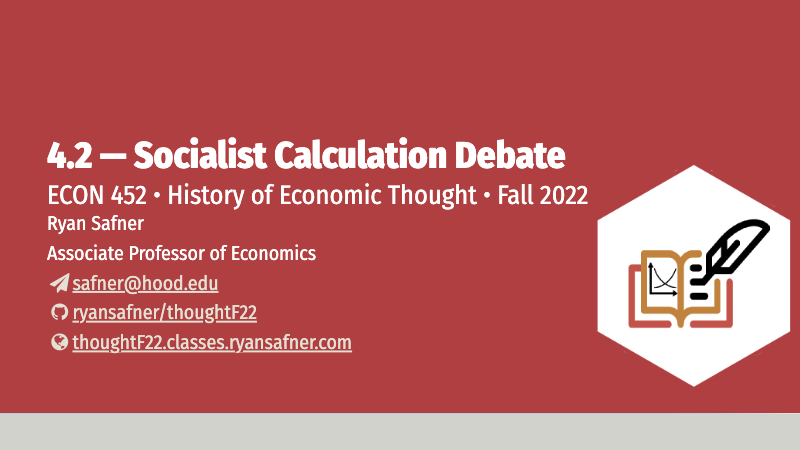4.2 — The Socialist Calculation Debate — Class Content
Overview
One of the implications of neoclassical economics is that we have discovered all of the optimal conditions — in production, in consumption, and in exchange — for maximizing the value of resources for society. Markets and a market-based economy have lots of problems but we know the optimal results they can achieve. So, since economists have discovered the optimal conditions for resource allocation, why can’t the government just replace the market to efficiently allocate resources? It will achieve the same results as a market equilibrium, and arguably for the better, since it can avoid the problems with markets!
This claim, coupled with the fact that in the late 1910s a major European power undergoes a revolution where the victors try to establish a socialist society, constitutes the focus of the “socialist calculation debate.” How would a socialist economy and society actually operate? Is it superior to market-based economy and society?
Readings
Required Readings
Ch.13 “Austrian Critique of Neoclassical Economics and the Debate about Socialism and Capitalism” in Landreth & Colander
Mises (1920), “Economic Calculation in the Socialist Commonwealth”
End of Ch.12 “Institutional and Historical Critics of Neoclassical Economics” in Landreth & Colander
Recommended Readings:
- Hayek (1945), “The Use of Knowledge in Society”
- White, 2012, “The Bolshevik Revolution and the Socialist Calculation Debate,” Ch. 2 in The Clash of Economic Ideas
The following Wikipedia entries can also provide more background:
Questions to Help Your Reading
- How would a centrally planned (and/or socialist) economy function?
- Is socialism as a viable political and economic system “disproven?”
- If socialism is inefficient, impossible, or has poor incentives, how did socialism and central planning in the USSR last so long? Was it really socialism and central planning?
- What do you make of the economists’ claims that we could centrally plan, or simulate, a market economy, with mainstream economic models (such as general equilibrium theory) for socialist ends?
- Mises argues that “Every step that takes us away from private ownership of the means of production and from the use of money also takes us away from rational economics.” While there are no serious attempts at socialist societies anymore, and all societies are some variant of capitalism, democracy, and/or a mixed economy, does Mises’ quote (and broader claim) still have relevance today?
- A majority of young Americans have positive feelings towards socialism, and negative feelings towards capitalism. Why do people still advocate for socialism today? Is it the same kind socialism as Marx envisioned, or the Soviet experience? What about “capitalism?”
- How can we trace the differences and divergences between the Marxian view of the State and the liberal (Smith, Locke, etc) view of the State?
Slides
Below, you can find the slides in two formats. Clicking the image will bring you to the html version of the slides in a new tab. The lower button will allow you to download a PDF version of the slides.
You can type h to see a special list of viewing options, and type o for an outline view of all the slides.
I suggest printing the slides beforehand and using them to take additional notes in class (not everything is in the slides)!
Assignments
Participation/Discussion Board Posts Due 8 PM Fri Nov 18
This week’s graded discussion is worth 5 points, and can be a combination of discussion in class, and/or posts on the Blackboard Discussion Board by 8 PM this Friday November 18.
Tournament Votes
The first round of the Classical division of the “Most Interesting Economist in History” tournament is live. Please post your votes in the discussion board.
